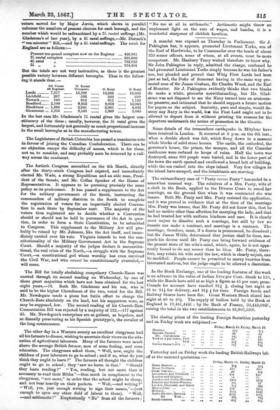The other day in a Western county an excellent clergyman
had all his farmers to dinner, wishing to ascertain their views on the edu- cation of agricultural labourers. Many of the farmers were much above the average British farmer, men of some feeling, and even education. The clergyman asked them, "Well, now, ought the children of your labourers to go to school ; and if so, what do you think they ought to learn ?" The farmers all thought the children ought to go to school ; they saw no harm in that."' Should they learn reading ?" "Yes, reading, but not more than is necessary to read their Bibles "—thus much in compliment to the clergyman, "not more," in order that the school might be cheap, and not bear heavily on their pockets. "Well,—and writing ?" Well, yes, just enough writing to sign their names,"—(not enough to open any other field of labour to them). "Well, —and arithmetic ?" Emphatically "No" from all the farmers ; "No use at all in arithmetic." Arithmetic might throw an unpleasant light on the rate of wages, and besides, it is a wonderful sharpener of childish faculties.






























 Previous page
Previous page